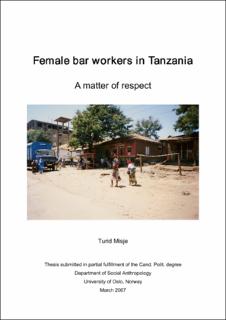| dc.description.abstract | This thesis is about the lives and concerns of female bar and guesthouse workers in Moshi town, the urban centre of Kilimanjaro region in northern Tanzania. In the era of AIDS, this group of women has been singled out as a ‘core risk’ or ‘core transmitter’ group in the spread of HIV infection, and has been the object of a substantial number of studies in Africa at large and in Tanzania in particular. These studies have primarily been concerned with the women’s sexual behaviour and awareness of protective measures. I maintain that due to their biased research focus, they leave us with a rather skewed impression of the women and the lives they actually live; women who work in bars and guesthouses tend to be defined almost solely by how they manage, or are believed to manage their sexuality. In this work I draw a more complex picture of this group of women and their ‘lived¬in worlds’ (Wikan 1990), where their perceptions of themselves as working women, neighbours, mothers, daughters and ‘developed townswomen’ is part of the picture. Inspired by Unni Wikan (1990) and Susan Whyte (2002), I focus on the women’s ‘concerns’, in terms of what is ‘at stake’ for them in their daily lives both in more general terms and in particular situations.
The notion of heshima (‘respect’) is central to how a person’s moral character and behaviour is evaluated in Moshi. In the dominant moral discourse about female bar and guesthouse workers they are said to have no ‘respect’. I argue that the women actively and intelligently engage with this devaluation of their persons, and demonstrate how their everyday practices and discussions, including those related to their sexuality, interrelate and intersect with ways of ‘producing respect’ in Moshi.
In the last two chapters I explore in depth why women are thus negatively stereotyped. A main contention is that employing the concepts ‘prostitute’ and ‘prostitution’ cross¬-culturally can be misleading because they entail specific Western ideas of what is and what is not legitimate management of sexuality and sexual relationships. | en_US |
